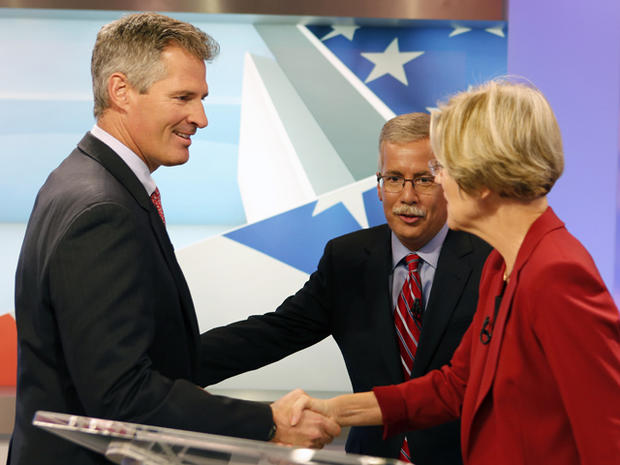In Mass. Scott Brown seeks the crossover vote
(CBS News) Following their first debate last night, Republican Senator Scott Brown and his Democratic challenger Elizabeth Warren head into the home stretch of what is perhaps the county's most-watched Senate race. But while the rest of the nation seemed to be debating 47 percent this week, Brown's campaign is probably more concerned with another figure: 300,000 - which is roughly the number of President Obama's voters that Brown needs to vote for him.
With a Democratic President running strongly atop the ticket, that means 15 to 20 percent of President Obama's backers in Massachusetts need to split their tickets for Brown to win. In this very Democratic state, that's the whole key.
It is little wonder then that Senator Brown is running ads showing President Obama praising his work on recent legislation. This also explains why Senator Brown was quick to distance himself from the Romney controversy that erupted earlier this week. In this election cycle, Brown needs some Obama voters in order to win.
Here is the math: We expect over 2.9 million total votes to be cast in November. The president will likely earn about 60 percent of the vote. In the last five elections, the Democratic nominee for president has won more than 62 percent of the two-party vote. That means 1,750,000 people are probably voting for Obama - and if they all also stay with the ticket and back Elizabeth Warren, she would likely win.
If 300,000 of those people flip, though, the count is at approximately 1,450,000 votes apiece for Brown and Warren.
Although one might think different races get different results, the fact is exit polls often show that many partisans stay with their ticket, voting for the same party in senate and presidential races.
Another way to look at it is that Brown has to boost up his votes now that the electorate will be larger. When he was elected, it was in a special election with turnout lower than is expected in a presidential race. In January 2010, 1,168,178 people in Massachusetts voted for Brown. Because this will be a regular general election in a presidential election year, he can expect at least another 700,000 people are going to vote. That brings you to the same calculus. Subtracting the votes he won in January 2010 from the number he needs this fall, leaves a shortfall of roughly 300,000 votes. Provided he keeps the votes of the same people who supported him that January, Brown needs less than half of the additional new voters, or 43 percent, of the increased turnout, to swing his way.
So who are the potential ticket-splitters he's after? First, of course, are the independents. Massachusetts partisan identification ran more than two to one Democratic in 2008 (43 percent to 17 percent) with 40 percent independents - that's where Brown has to start. 40 percent of those independents voted for John McCain; Brown can probably capture those votes and add them to the base Republican vote. Recent polls have shown independents breaking for Brown. A recent University of Massachusetts poll, which had Brown leading, showed independents voting heavily for him over Warren. Just under one in five Democrats were splitting tickets to back him.
Even though the leader has been inconsistent among the various polls - suggestive of a tight race - a few consistent themes have emerged that define this race going forward. Polls have shown voters approve of Brown's job performance and give him higher favorability ratings than Warren. They believe him to be either an independent voice for the state or less partisan than Warren. On the other hand, the other findings show that likely voters think that Warren would do a better job looking out for the interests of the middle class. That could be important in her keeping working-class Democrats and independents in her camp.
There is also the national vs. local theme that could be critical. In a recent Suffolk University poll, half of the respondents said there was a benefit to having both a Democratic senator and a Republican senator representing the state in Washington. Warren will try to tie Brown to the Republicans in Washington, seeking to keep her Democratic base intact.
Joe Williams is a Ph.D. Candidate at Harvard University and a CBS News Elections Assistant.
